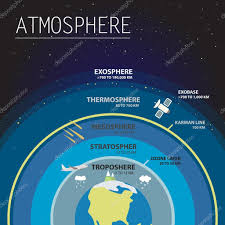WHAT IS ATMOSPHERE- STRUCTURE & LAYERS
DEFINITION
Atmosphere is layer of mixture of gases that surround the earth or a planet. It is colorless, odorless, and tasteless mixture of gases that extends up to a height of about 1600 km. Though 99% of total mass of the atmosphere is within 40 km from the earth. Atmosphere makes the earth habitable, without it life is impossible on the earth.
COMPOSITION OF ATMOSPHERE
GASES VOLUME (%) WEIGHT (%) Nitrogen 78.88 75.527 Oxygen 20.948 23.143 Argon 0.930 1.282 Carbondioxide 0.033 0.045 Other gases traces traces
STRUCTURE OF ATMOSPHERE
Depending on vertical temperature, atmosphere is grouped into four major layers as described below:

Troposphere: It is the lower layer lies above the earth up to the height of 8-18 km. It contains 85% of the total mass of atmosphere and is the densest part. All weather characteristics like rain, cloud, fog, dew, mist etc. occur in this layer. The temperature decreases with increase in altitude in this layer.
Stratosphere: It is just above the troposphere and lies beyond the height of 8-18 km extending up to 50 km depending on latitude. The ozone layer found in this strata, absorbs most of the sun’s ultraviolet rays (very harmful to us) which heat up the stratosphere. The stratosphere is a very stable layer, and not much weather occurs in it. For this reason, most planes fly in the lower part of the stratosphere. It contains only 15% of the atmosphere mass and all photo chemical reactions occur here in this layer. Temperature increases with increase in altitude up to 50 km. This is the warmest layer.
Mesosphere: This layer is lies above stratosphere and characterized by strong decrease in temperature with increase in altitude up to 80 km, then warms up again in next layer i.e. thermosphere.
Thermosphere: It is uppermost layer lies above mesosphere and characterized by steadily increase in temperature with altitude. Ionosphere is just lower strata of thermosphere and due to this layer long distance radio communication is possible.
Read also..
ESSAY ON ENVIRONMENTAL POLLUTION
WHAT IS ECOLOGY- OVERVIEW & TYPES
TROPOPAUSE, STRATOPAUSE & MESOPAUSE:
All these are transition layer that separates the all four layer- troposphere, stratosphere, mesosphere and thermosphere.
Atmosphere has strong influence on climate, therefore the changes takes place in lower layers of the atmosphere are the climatic changes.
Read more…
DIFFERENCE BETWEEN CLIMATE & WEATHER
WHAT IS WEATHERING- TYPES & PROCESS
WHAT IS SOIL EROSION- TYPES & MECHANISM
SOIL TYPES IN INDIA: FEATURES
Good